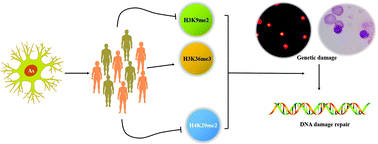Modifications of H3K9me2, H3K36me3 and H4K20me2 may be involved in arsenic-induced genetic damage†
Abstract
Endemic arsenic poisoning is a worldwide disease and many studies show that arsenic has obvious genetic toxicity. However, the mechanism of arsenic-induced genetic damage is unclear. In this study, coal-fired arsenic poisoning patients in the Guizhou Province, China, were selected as research subjects. Through an analysis of the relationship between genetic damage and histone modification levels and by comparing the control and arsenic poisoning groups, further analysis of their relationship was carried out, the aim being to explore the role of histone modification in arsenic-induced genetic damage. The result shows that arsenic may inhibit the modification level of H4K20me2 and H3K9me2, and increase the modification of H3K36me3, involved in the repair of DNA damage induced by arsenic. This study could provide a new pathway for studies of the genetic toxicity of arsenic.


 Please wait while we load your content...
Please wait while we load your content...